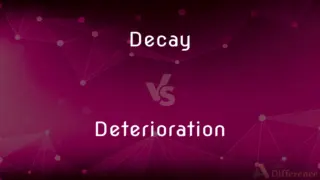Lexicon vs. Syntax — What's the Difference?
By Tayyaba Rehman & Maham Liaqat — Updated on April 5, 2024
A lexicon encompasses the vocabulary of a language, including words and expressions, focusing on meaning and word use, while syntax refers to the rules and structures governing how words are combined to form sentences and convey meaning effectively.
Difference Between Lexicon and Syntax
Table of Contents
ADVERTISEMENT
Key Differences
The lexicon of a language is its inventory of words and expressions, including their meanings, pronunciations, and morphological properties. It is essentially the building block of language, providing the necessary components for communication. On the other hand, syntax is concerned with how these building blocks are arranged to create coherent sentences, focusing on grammatical structures, sentence formation, and the relationships between words.
While the lexicon deals with the word-level aspects of language, such as semantics (meaning) and etymology (word origins), syntax operates at the sentence level, emphasizing rules that dictate word order, agreement, and the hierarchical structure of language components. This distinction highlights the lexicon's role in word selection and syntax's role in word arrangement.
In learning a language, mastering the lexicon involves acquiring vocabulary and understanding the nuances of word use, including connotations, collocations, and idiomatic expressions. Conversely, learning syntax entails understanding grammatical rules, such as tense, aspect, mood, and the structure of different types of sentences (declarative, interrogative, imperative, etc.).
The development of a lexicon is a dynamic process, with languages continually adopting new words and phasing out obsolete ones, reflecting changes in culture, technology, and society. Syntax, while also subject to change, tends to evolve more slowly, maintaining a degree of stability that helps ensure mutual intelligibility among speakers across generations.
Both lexicon and syntax are crucial for effective communication. A rich lexicon allows for precise expression, while a firm grasp of syntax ensures that the arrangement of words conveys the intended meaning. Their interplay is fundamental to the complexity and versatility of human language.
ADVERTISEMENT
Comparison Chart
Focus
Vocabulary of a language, including words and meanings.
Rules governing the structure of sentences.
Level of Language
Word-level aspects such as meaning and usage.
Sentence-level rules and arrangements.
Learning
Involves acquiring vocabulary and understanding usage.
Entails grasping grammatical rules and structures.
Change and Evolution
Dynamic, with constant updates and changes.
More stable, with slower changes over time.
Role in Communication
Provides the components for expression.
Ensures coherent and meaningful sentence construction.
Compare with Definitions
Lexicon
A specialized lexicon exists for different fields or activities.
Medical lexicon includes terms like angioplasty.
Syntax
Mastering syntax is crucial for effective communication.
Proper syntax ensures clarity and coherence in speech and writing.
Lexicon
It includes not only words but also idioms and phrases.
Phrases like kick the bucket enrich the English lexicon.
Syntax
It includes the structure of sentences and their grammatical relationships.
Syntax explains why The cat sat on the mat is correct.
Lexicon
Lexicons evolve, incorporating new words as language use changes.
Selfie was added to the lexicon due to technological advances.
Syntax
Syntax varies significantly across languages.
In Japanese, the verb typically comes at the end of the sentence.
Lexicon
Understanding a lexicon is crucial for mastering a language.
Expanding one's lexicon is essential for language proficiency.
Syntax
Syntax governs the use of punctuation and sentence variety.
Syntax rules determine the use of commas, periods, and question marks.
Lexicon
A lexicon is a language's complete set of words and expressions.
The English lexicon includes terms from many languages.
Syntax
Syntax is the set of rules for forming sentences in a language.
English syntax dictates the order of subject, verb, and object.
Lexicon
A lexicon is the vocabulary of a language or branch of knowledge (such as nautical or medical). In linguistics, a lexicon is a language's inventory of lexemes.
Syntax
In linguistics, syntax () is the study of how words and morphemes combine to form larger units such as phrases and sentences. Central concerns of syntax include word order, agreement, the nature of crosslinguistic variation, and the relationship between form and meaning.
Lexicon
A dictionary.
Syntax
The study of the rules whereby words or other elements of sentence structure are combined to form grammatical sentences.
Lexicon
A stock of terms used in a particular profession, subject, or style; a vocabulary
The lexicon of surrealist art.
Syntax
A publication, such as a book, that presents such rules.
Lexicon
The vocabulary of an individual person
“A few of the women tittered, whether in response to the fluctuating octaves of my voice or the awkwardness of my lexicon” (Elisabeth Brink).
Syntax
The pattern of formation of sentences or phrases in a language.
Lexicon
(Linguistics) The morphemes of a language considered as a group.
Syntax
Such a pattern in a particular sentence or discourse.
Lexicon
The vocabulary of a language.
Syntax
(Computers) The rules governing the formation of statements in a programming language.
Lexicon
A dictionary that includes or focuses on lexemes.
Syntax
A systematic, orderly arrangement.
Lexicon
A dictionary of Classical Greek, Hebrew, Latin, or Aramaic.
Syntax
A set of rules that govern how words are combined to form phrases and sentences.
Lexicon
(programming) The lexicology of a programming language. (Usually called lexical structure.)
Syntax
The formal rules of formulating the statements of a computer language.
Lexicon
(rare) Any dictionary.
Syntax
(linguistics) The study of the structure of phrases, sentences, and language.
Lexicon
The vocabulary used by or known to an individual. (Also called lexical knowledge.)
Syntax
Connected system or order; union of things; a number of things jointed together; organism.
They owe no other dependence to the first than what is common to the whole syntax of beings.
Lexicon
A set of vocabulary specific to a certain subject.
The baseball lexicon
Syntax
That part of grammar which treats of the construction of sentences; the due arrangement of words in sentences in their necessary relations, according to established usage in any language.
Lexicon
A list thereof.
A baseball lexicon
Syntax
The grammatical arrangement of words in sentences
Lexicon
A vocabulary, or book containing an alphabetical arrangement of the words in a language or of a considerable number of them, with the definition of each; a dictionary; especially, a dictionary of the Greek, Hebrew, or Latin language.
Syntax
A systematic orderly arrangement
Lexicon
A language user's knowledge of words
Syntax
Studies of the rules for forming admissible sentences
Lexicon
A reference book containing an alphabetical list of words with information about them
Common Curiosities
Why do languages have different syntax?
Languages develop unique syntactic rules based on historical, cultural, and linguistic influences, leading to diversity in sentence structure and word order.
Can a word belong to more than one lexicon?
Yes, words can belong to multiple lexicons, especially in languages that share vocabulary or in specialized fields with common terms.
How can understanding syntax improve language skills?
Understanding syntax enhances the ability to construct sentences correctly, improving both written and spoken communication.
How does syntax affect the meaning of sentences?
Syntax affects meaning through the arrangement of words, ensuring that sentences convey the intended message clearly and coherently.
Can changes in the lexicon affect syntax?
While changes in the lexicon primarily affect vocabulary, significant lexical innovations can influence syntactic structures, especially in the adoption of new phrases or sentence patterns.
Is syntax the same as grammar?
Syntax is a component of grammar focused on sentence structure, while grammar also includes morphology (word formation), phonology (sound system), and semantics (meaning).
Why is the lexicon important in language learning?
The lexicon provides the vocabulary necessary for communication, including understanding and expressing ideas, emotions, and information.
How do new words enter a lexicon?
New words can enter a lexicon through technological advancements, cultural exchange, linguistic creativity, and the need to express new concepts.
Does everyone use the same lexicon within a language?
While there is a common base, individuals may have personal lexicons that vary based on factors like region, profession, and interests.
How does syntax contribute to the evolution of a language?
Syntax evolves to accommodate changes in communication needs, influencing how ideas are structured and understood over time.
Share Your Discovery

Previous Comparison
Clue vs. Key
Next Comparison
Decay vs. DeteriorationAuthor Spotlight
Written by
Tayyaba RehmanTayyaba Rehman is a distinguished writer, currently serving as a primary contributor to askdifference.com. As a researcher in semantics and etymology, Tayyaba's passion for the complexity of languages and their distinctions has found a perfect home on the platform. Tayyaba delves into the intricacies of language, distinguishing between commonly confused words and phrases, thereby providing clarity for readers worldwide.
Co-written by
Maham Liaqat













































